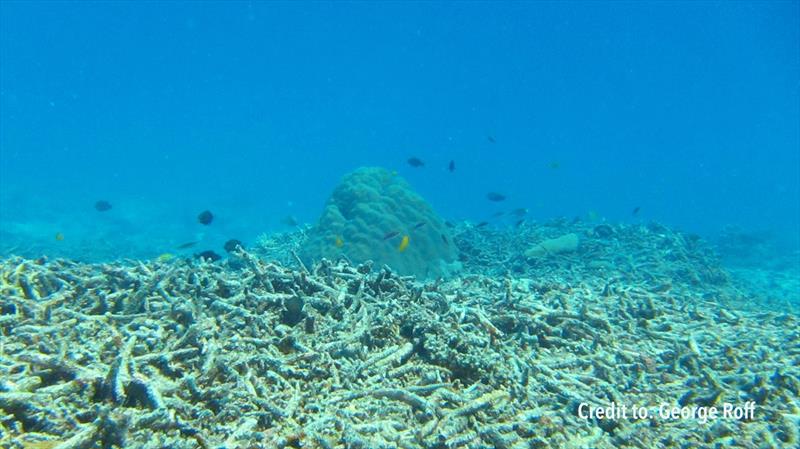
Extinctions linked to new assemblages of species
by Melissa Lyne 12 Oct 2020 21:26 NZDT

A huge pile of dead branching Acropora corals in the foreground and the few remaining live corals are massive Porites (centre and far right in photo) © George Roff
Scientists have found that as the world undergoes profound environmental change, identifying and protecting 'novel' communities of species can help prevent extinctions within vulnerable ecosystems.
Professor John Pandolfi and Dr Timothy Staples from the ARC Centre of Excellence for Coral Reef Studies at The University of Queensland (CoralCoE at UQ) are the lead authors of a new study in Science that looked at how combinations of plankton species changed across the world's marine ecosystems in the past 66 million years. From this, their team developed a world first method to detect 'novel' communities of species across all ecosystems.
"A novel ecological community is one with combinations of species that are different to any past observations from that site," Prof Pandolfi said. "These different species combinations can be due to new species arriving in the community, existing species leaving, or species becoming rarer or more common."
"We found that when novel communities formed, existing species were twice as likely to disappear from the community permanently, representing a 'local' extinction."
"Species in the novel community were also more likely to be new arrivals that had never been observed in the community before."
An example of a modern novel community is the coral reefs of the Caribbean, where the two once dominant species of branching coral are now rare. Those reefs are now home to new, or novel, communities of corals. The loss of the branching corals is due to the impacts of overfishing, changes in water quality, and climate change—resulting in new configurations of coral species within the Caribbean reef communities. And the shift means the benefits of the reef are now different: different species means different inhabitants and functions.
"The challenge is to manage at risk or vulnerable areas like this where novel communities exist, or where they're in the process of forming," Prof Pandolfi said.
"To do this we need to understand the changes in species composition we see in novel communities, as well as what is driving these changes. To achieve these goals, we need to be able to reliably identify when a novel community has emerged."
The study outlines the first standardised, quantitative methodology for determining the existence of novel ecological communities. The researchers used a database of marine plankton over millions of years, but the methodology was designed to be applied more generally.
"We came up with a measure of novelty that can be used with community data from any time scale, organism or ecosystem, so comparative approaches to the study of novelty are now possible," Dr Staples said. "In this study, we applied our methodology to the past 66 million years, but it would work just as well on much shorter time frames."
The researchers examined the marine plankton record using a global set of microfossil data from deep sea drilling cores— the NSB marine microfossil database, created and run by the Museum für Naturkunde in Berlin. By incorporating updated taxonomy and age models they built community data for species across geological time.
Prof Pandolfi said while novelty was rare, extinction was an important component. And after novel communities emerged, subsequent communities were more likely to develop into yet other novel states.
"Novelty begets novelty," Prof Pandolfi said. "And the likelihood of extinction was higher when novel communities emerged."
He said the pressures that cause communities to become novel in the first place need to be relieved. "Otherwise we may end up with cascading novelty, where the emergence of novel communities drives further novelty, including the loss of existing, native, species."
Prof Pandolfi says this means when a novel community is identified it needs attention and effective preventive management. He also says future studies need to identify novel communities within vulnerable ecosystems, such as the Great Barrier Reef. "At the end of the day that's where we want to go to test this," he said.
Though the time frame of evolutionary change is generally much slower than the timeframe of change currently occurring on the Great Barrier Reef, there are signs that novelty communities may be emerging there. The assemblage of corals on the reef are not what they were five or ten years ago.
"Our novelty framework is equally applicable to investigate the Great Barrier Reef at this ecological scale," Dr Staples said.
"Modern novel ecological communities may need to be managed effectively to prevent the propagation of subsequent novel communities, because of the associated risk of increased extinction," Prof Pandolfi said.
"We can't just throw in the towel and let those ecosystems degrade, we need to arrest this progression."
Paper: Pandolfi J, Staples T, Kiessling W. (2020). 'Increased extinction in the emergence of novel ecological communities'. Science. DOI: 10.1126/science.abb3996.